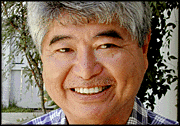Advertisement - Click to support our sponsors.


View Point
GOVERNOR Cayetano's pardon of Thomas Foley set off a torrent of public comment about the general issue of pardons in Hawaii. Such a discussion could be worthwhile were it not laced with confusion about the process of receiving a pardon, a process with which I became familiar while in charge of pardons for the Hawaii Paroling Authority. Pardons serve
useful purposeThe definition of a pardon, formulated some years ago with the assistance of former state Deputy Attorney General Michael Lilly, is "an act of grace which exempts the individual on whom it is bestowed, from the punishment the law inflicts for a crime the applicant has committed. It, nevertheless, does not imply innocence of the crime for which the individual is pardoned."
To clarify a point made in the Star-Bulletin's Aug. 16 article on pardons: Once an inmate leaves prison on parole or serves the maximum sentence, he or she has the right to seek public office and to vote as well. A pardon is not required.
"Express authorization to possess or use firearms" is granted only to those who require firearms in the course of employment, for example, police officers, prison guards and, in one case, for the security guard for former Gov. George Ariyoshi.
The Hawaii Paroling Authority does not grant this privilege to those who wish solely to resume the hobby of hunting. However, the Office of the Attorney General, through its investigative arm, can make an independent judgment for the governor's consideration.
All previously convicted felons or misdemeanants must follow a standard operating procedure before submitting a pardon application. Generally, all must wait a minimum of two years after discharge from parole or probation supervision before applying.
The most important factor of consideration is the kind of criminal offense incurred. For instance, violent offenders with a history of criminal conduct will have no chance of approval, especially under Governor Cayetano, who is more conservative than his predecessors.
Only 37 out of the 84 pardons were granted by Cayetano for felony offenses; the rest were misdemeanors. Foley was convicted of negligent homicide in a drunken-driving incident.
The other important factor to consider is the degree to which there has been a significant change in the pardon applicant and the positive effect made, perhaps through remorse and restitution to the victim.
There are about 3,000 inmates, 7,000 felony probationers and 1,500 parolees at any given time. Over the years, thousands of discharged felons and misdemeanants have resided within the community.
One may then conclude that those receiving pardons are a select few; some felons and most misdemeanants on the list were never previously confined.
Finally, the most disturbing element in this entire controversy over Foley's pardon is the public embarrassment and humiliation that those receiving pardons must have felt at having their names published in the newspapers.
It serves no good purpose, and is a reminder to their families, friends and employers of their past misconduct. Many of them were misdemeanants, and their convictions occurred decades ago. The most pertinent question is how many of those listed have reoffended and what percentage returned to criminal conduct.
In Foley's case, the governor assumed (and, in all probability, assumes correctly) that his previous problem with alcohol would not reassert itself and that parole supervision was not required to monitor his behavior. It is also likely that Cayetano felt no further punishment was necessary, since the surviving victim was strongly supportive of Foley.
THE decision as to the degree of punishment and supervision should be made by the victim who suffered the consequences of Foley's unlawful conduct -- not Mothers Against Drunk Driving, the general public or my friend, Honolulu Prosecutor Peter Carlisle, for whom I have the utmost respect.
The bottom line is that a pardon in Hawaii, unlike some mainland jurisdictions, does not expunge anyone's criminal record but is only an act of benign forgiveness (with the exception of Foley, who did not require parole supervision).
For the rest, it is a form of relief from guilt and a lightening of the burden on their shoulders. Possibly, it may assist in retaining or obtaining employment.
Pardons do have a useful place in our criminal justice system, but should be reserved for only the most deserving. Tom Foley fits in that category.
Edwin S. Uyehara retired as branch administrator of the Hawaii Paroling Authority in 1997.